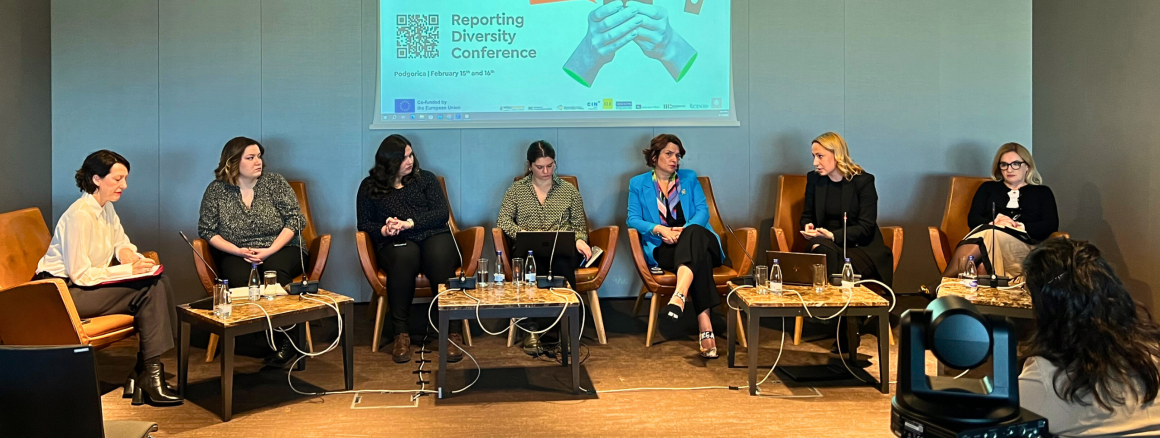WOMEN AND NATIONAL MINORITIES STILL THE MOST FREQUENT TARGETS OF HATE SPEECH – Results of media monitoring in the Western Balkans
February 22, 2024
Reporting Diversity Conference 15-16 February 2024
Podgorica, Montenegro
Reporting Diversity Network organised a two-day conference on hateful and harmful narratives in the Western Balkans where the Network presented preliminary results of the media monitoring reports, which will be published in March.
The conference brought together over 40 media experts, activists, civil society representatives from the Western Balkans, as well as many others who had a chance to follow the conference online.
“Societies in the Western Balkans are still very divided on various levels, from inter-ethnic relations to how society treats women and important social issues such as gender-based violence. Violent communication is normalised, and that is the ‘culture’ of public speech which often comes from political figures, even religious leaders, and it strongly affects human and civil rights and the well-being of citizens throughout the Balkans,” said Ivana Jelača, coordinator of the Network.
The monitoring reports gave a strong impression that social divisions in the Western Balkans are still very present in the media and public discourse, which affect relations between neighbours in the region, as well as the position of certain social groups, starting with women, but also affecting ethnic minorities and the LGBTIQ+ community.
The research in North Macedonia showed that a large number of cases were related to sexism (32%), as well as hateful narratives towards national minorities (30%) and attacks on political or ideological grounds, contributing to the social polarisation and fueling intolerance. In Kosovo, the most frequent targets of hate speech were ethnic minorities, especially the Serb and Roma communities.
In Serbia, the biggest number of examples of hate speech were recorded in the categories of gender (24.8%) and ethnicity (20.4%). According to the research results, the third most frequently targeted group is the LGBTIQ+ community (17.7%), which represents a slight increase in the percentage compared to the previous report (14.6%), mainly due to the public campaign against the organisation of EuroPride, in Belgrade in 2022.
The main source of hate speech in Albania is the media. They continue to spread and perpetuate harmful and discriminatory stereotypes of the “other” when reporting on different social groups. Gender-based hate speech remains a significant challenge, negatively affecting gender equality.
In Montenegro, the biggest source of tensions remains ethnic diversity, therefore, hate speech based on ethnicity is represented in 31% of the total findings. Right after hate speech directed at gender and gender identity (24%), comes hate speech directed at political opponents (17% of findings) and religion with 13% of total findings.
Joseph Harker, the Guardian’s senior editor for diversity and development, joined the discussion online and spoke about policies on diversity within the newsroom and in content production. To watch the conversation, click here.
Since gender remained the category in which the most examples of hate speech were recorded in most countries of the Western Balkans, on the second day of the conference, February 16, we also discussed anti-gender narratives, their impact on the Western Balkans’ society, as well as potential strategies for its denouncing. Livestream is avaliable here.
The discussion gathered the editor of Discriminacija.ba Slobodanka Dekić, member of the Executive Board of Albanian Women in Audiovisual Media Valjbona Sulca, executive director of the Center for Women’s Rights Maja Raičević, as well as a researcher at the Faculty of Political Sciences of the University of Belgrade Nađa Bobičić.
The results of the media monitoring reports will be published in March 2024 on Reporting Diversity Network communication channels.
